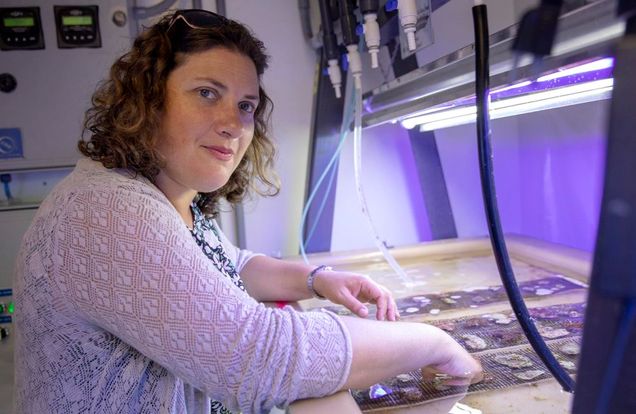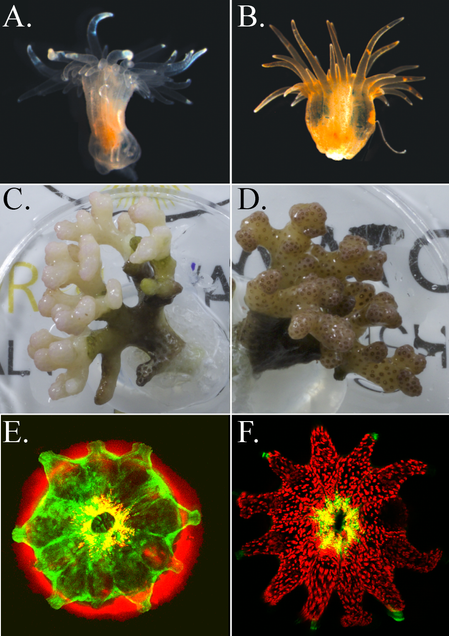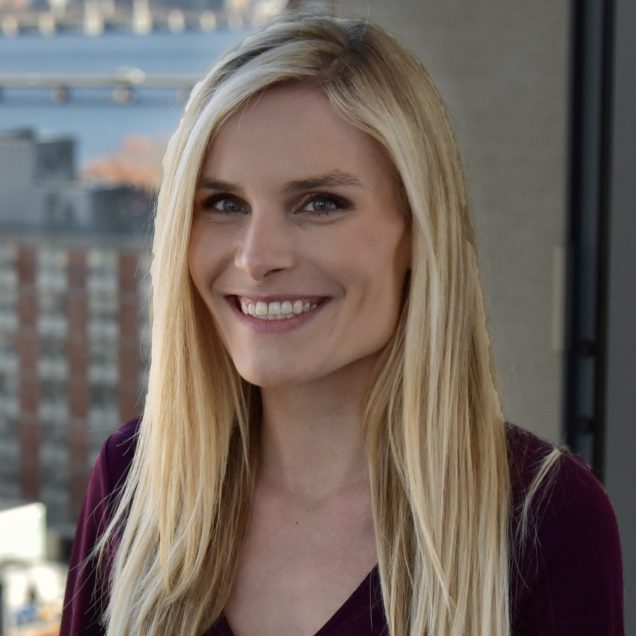Leah Williams Gives Talk at EMBO | EMBL Symposium

Leah Williams of the Gilmore Lab gave an invited talk at EMBO | EMBL Symposium: The Organism and its Environment, held at EMBL Heidelberg, Germany from March 1-4, 2020. The title of her talk was "Evolution of immune regulation: structure, activity, and biology of transcription factor NF-kappaB in early metazoans."
Leah's research explores the evolutionary origins and molecular mechanisms of immunity in basal marine organisms such as corals and sponges. Her research has been supported by an NSF Graduate Research Fellowship and the National Science Foundation.
Julie Jung’s Paper Shortlisted for 2019 Journal of Experimental Biology Outstanding Paper Prize

Julie Jung of the Warkentin Lab recently received recognition for "How do red-eyed treefrog embryos sense motion in predator attacks? Assessing the role of vestibular mechanoreception." The paper was shortlisted for the 2019 Journal of Experimental Biology Outstanding Paper Prize, and was described as a "fascinating finding, [with] carefully planned experiments and very well written up."
Read more about why the paper was chosen here. Congratulations, Julie!
Jenna Rindy Receives Deland Award

Jenna Rindy of the Templer Lab was recently awarded a $10,000 Deland Award from the Arnold Arboretum of Harvard University. The award supports investigations by graduate and advanced undergraduate students working on the comparative biology of woody plants, including developmental biology, physiology, genetics, reproductive biology, or ecology. Jenna is interested in researching the effects of anthropogenic pollutants on urban forestry and human populations in urban areas. In particular, she plans to investigate how PM2.5 deposition causes damage to urban tree leaves, and how living nearer to urban forest systems affects human health.
Congratulations, Jenna!
Remembering Sir Hans Kornberg
The Department of Biology will be hosting a memorial service for Sir Hans Kornberg on Wednesday, March 4, 2020. All are welcome to attend and RSVPs are kindly requested.
The Department of Biology at Boston University mourns the loss of Sir Hans Kornberg, Professor of Biology and a beloved member of the BU Biology Department for 24 years.
Born in 1928, Hans Kornberg fled to the UK from Nazi Germany at the age of 11. After finding an interest in chemistry, Dr. Kornberg studied in the Krebs Lab at the University of Sheffield and earned his PhD in Biochemistry in 1953. After working in several research labs in the US and the UK and lecturing at Oxford, Dr. Kornberg was a Professor of Biochemistry at the University of Leicester. He was the Sir William Dunn Professor of Biochemistry at the University of Cambridge, and later served as the 34th Master of Christ's College and the Deputy Vice-Chancellor for the University of Cambridge. Upon retirement in 1995, Dr. Kornberg was invited to serve as Director of the Boston University University Professors Program, which he did until the program's end in 2011. In addition to leading the UNI program, he was a Professor of Biology and he taught Biochemistry to undergraduate and graduate students at Boston University for the past 24 years.
He was the recipient of numerous awards and honors. He was appointed Fellow of the Royal Society in 1965, and was knighted in 1978. He holds 11 honorary doctorates and was a Fellow of the American Academy of Microbiology, as well as a Foreign Associate Member of the National Academy of Sciences and American Academy of Arts and Sciences. He received the UK Biochemical Society’s inaugural Colworth Medal and the Warburg Medal of the German Society for Biochemistry and Molecular Biology.
Sir Hans’ research, conducted for over 70 years, was focused on the regulation of carbohydrate transport in micro-organisms. Starting out as a bottle washer for Hans Krebs, Hans Kornberg was an author of over 250 publications. Two of his significant scientific accomplishments were the elucidation of the glyoxylate cycle and the concept and mechanisms of anaplerosis, the former being a cycle used by plants and other non-animals to enable the biosynthesis of biomass from 2-carbon compounds, and the latter being an important mechanism assuring that carbon oxidation by the Krebs cycle can continue by replenishing the intermediates that are drained by various biosynthetic reactions.
Sir Hans will be greatly missed by his colleagues and students. Not just a brilliant biochemist and skilled educator, Dr. Kornberg always had an anecdote or witty story at hand, whether about his friendship with Julie Andrews in his youth or his affinity for Latin wordplay. Visitors to the Kornberg Lab were promptly invited to take part in the most important experiment of all: making coffee! Sir Hans is remembered for his generosity, incredible wit, many stories, endless puns, and cheerful nature.
Sir Hans was the dearly loved husband of Donna and of the late Monica; cherished father of Julia, Rachel, Jonathan and Simon; and adored grandfather and great-grandfather. The Funeral Service will take place at noon on December 20th at the Falmouth Jewish Congregation, 7 Hatchville Road, East Falmouth, MA. Flowers if desired to: Lady Kornberg, c/o Chapman Cole & Gleason, 475 Main Street, Falmouth, MA 02540. Donations may be made in lieu of flowers, in Hans' memory to the Hans Kornberg travel prize at Christ's College, Cambridge, England. For online guestbook and directions, please visit Chapman, Cole, & Gleason Funeral Home in Falmouth, MA - 508.540.4172
Professor Rotjan Featured in Lab Animal Article

Professor Randi Rotjan was featured prominently in "The quest for an animal model of coral health and disease," an article in the January 27 issue of Lab Animal, a Nature research journal. The article describes how the temperate coral Astrangia poculata is being studied alongside the anemone Aiptasia as an important and emerging model system to studying corals. Rotjan is co-leading a growing group of researchers interested in this model coral. Research conducted by BU graduate students, including a Dynamic Energy Budget model by Caroline Fleming, is also referenced in the article.
Rotjan, along with Professors Finnerty, Davies, and Kaufman, have been pioneering work with this coral with BU Biology and BU Marine Program graduate and undergraduate students. Read the full article here.
Professors Gilmore and Davies Awarded NSF Grant for Interdisciplinary Research

Professor Primack Receives Two National Science Foundation Grants
Biology Professor Richard Primack recently received two new National Foundation grants. The first for $242,000, “Phenological mismatch between trees and wildflowers mediated by environmental variability and plant invasions”, builds on the observations of Henry David Thoreau, and is a collaborative grant with colleagues from the Carnegie Museum and the University of Pittsburgh. The second grant for $277,526, titled, “The impacts of changing phenology on species, ecological interactions, and conservation”, is funded the NSF OPUS program, and will involve Primack and his former grad students writing review papers in climate change biology and making their data set publicly available.
Ashley Comer, Dr. Tushare Jinadasa, & Dr. Alberto Cruz-Martín Published in PLOS Biology

GPN PhD student Ashley Comer and Biology Postdoctoral Fellow Dr. Tushare Jinadasa in Alberto Cruz-Martín's Lab recently co-authored an article published in PLOS Biology, "Increased expression of schizophrenia-associated gene C4 leads to hypoconnectivity of prefrontal cortex and reduced social interaction." The article was featured on the January 2020 cover.
Schizophrenia is a debilitating psychiatric disorder characterized by hallucinations, emotional withdrawal and a decline in cognitive function. Comer, Jinadasa and colleagues have found that a highly-associated schizophrenia gene, complement component 4 (C4), plays a direct role in the pathogenesis of disease-relevant phenotypes. Increased expression of the immune gene C4 leads to reduced connectivity of neurons in the medial prefrontal cortex, a brain region with notable gray matter loss in schizophrenia. This disruption in the development of the frontal circuits caused deficits in the social behavior of young mice that persisted into adulthood. Taken together, this finding is important because it reveals a critical window in the development of the prefrontal cortex in which C4 could be therapeutically targeted to alter phenotypes in schizophrenia.
Read the article here.
Heather Hook Recipient of Inaugural Kilachand Doctoral Fellowship

Heather Hook of the Siggers Lab is a recipient of the inaugural Kilachand Doctoral Fellowship. This fellowship is funded by the Multicellular Design Program (MDP), which combines research in Synthetic Biology, Microbial Engineering, Tissue Engineering, Data Science, and Biophysics to understand the design principles of multicellular systems.
Heather’s research is focused on developing a new high-throughput technique, termed CASCADE (Comprehensive Assessment of Complex Assembly at DNA Elements), to precisely profile the effects of single nucleotide variants on the indirect recruitment of transcriptional cofactors to DNA across different cell types and stimulus conditions. Using macrophage nuclear extracts, CASCADE has been used to map the determinants of constitutive and stimulus-dependent recruitment of cofactors to various enhancers and promoters of immune response genes. Furthermore, CASCADE has been used to characterize defective cofactor recruitment at known stimulus dependent GWAS single nucleotide variants (SNPs) implicated in immune diseases.
CASCADE will be used for Heather’s collaborative research project with the Mostoslavsksy lab of the Center of the Regenerative Medicine for her MDP fellowship. The goal of the project is to use CASCADE to identify transcriptional regulators controlling cell fate. Heather plans on following the development of induced pluripotent stem cells (iPSCs) to specific immune cells to identify transcriptional regulatory complexes governing developmental decisions. This work will help establish a new approach to understand and manipulate cellular fates that can be then be applied to more complex cellular differentiation systems.
Congratualtions, Heather!
Fall Semester GSO Travel Grant Winners
Congratulations to Brandon Güell (Warkentin Lab) and Natalie Vaisman (Frydman Lab) for being recipients of Fall 2019 Graduate Student Organization (GSO) Travel Grants! They are two of just ten winners.
